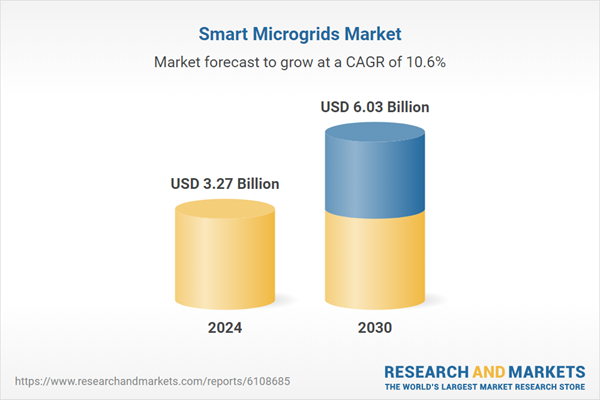Speak directly to the analyst to clarify any post sales queries you may have.
10% Free customizationThis report comes with 10% free customization, enabling you to add data that meets your specific business needs.
Key Market Drivers
Rising Demand for Energy Resilience and Grid Independence
The growing need for reliable and autonomous energy systems is a major factor driving the smart microgrids market. As extreme weather events, cyber threats, and aging infrastructure increasingly disrupt centralized power grids, smart microgrids offer a dependable alternative. Their ability to operate in island mode during outages makes them vital for mission-critical sectors such as healthcare, military, data centers, and academic campuses. These systems leverage automation, energy storage, and DER integration to maintain uninterrupted power supply, especially in remote or underserved areas where grid connectivity is limited or economically unfeasible. Furthermore, the trend toward decentralized energy generation and increased electricity demand from digitalization and e-mobility further supports the expansion of smart microgrid adoption.Key Market Challenges
High Initial Capital Investment and Complex Financial Structuring
A key obstacle in scaling smart microgrid projects is the significant upfront investment required for deployment. Establishing a smart microgrid involves the integration of various high-cost components such as renewable energy systems, energy storage units, smart meters, and digital communication platforms. Additionally, customized engineering and site-specific planning drive up overall project costs. Many potential users - including small communities, rural utilities, and industrial parks - face challenges in accessing financing, particularly in regions lacking supportive regulatory frameworks. The extended payback periods and uncertain ROI further deter investment, particularly when electricity tariffs are subsidized or when policy support is minimal.Key Market Trends
Integration of Renewable Energy Sources in Smart Microgrids
A major trend shaping the smart microgrids market is the accelerated integration of renewable energy sources such as solar, wind, and bioenergy. These DERs help reduce dependence on fossil fuels and support carbon neutrality goals. Smart microgrids utilize energy storage systems and digital control platforms to address the intermittent nature of renewables, enabling stable and efficient energy management. Advances in power electronics and energy storage have improved system flexibility and grid synchronization. Declining costs of solar panels and batteries are making renewable-powered microgrids viable even in remote, off-grid environments. This shift toward sustainable and self-sufficient energy solutions is driving market growth globally.Key Market Players
- Schneider Electric SE
- Siemens AG
- General Electric Company (GE Grid Solutions)
- ABB Ltd.
- Eaton Corporation plc
- Hitachi Energy Ltd.
- Honeywell International Inc.
- Tesla, Inc.
- Emerson Electric Co.
- NREL (National Renewable Energy Laboratory)
Report Scope:
In this report, the Global Smart Microgrids Market has been segmented into the following categories, in addition to the industry trends which have also been detailed below:Smart Microgrids Market, By Type:
- Hybrid
- Off-Grid
- Grid Connected
Smart Microgrids Market, By Component:
- Storage
- Inverters
Smart Microgrids Market, By Power Technology:
- Fuel Cell
- CHP
Smart Microgrids Market, By Application:
- Campus
- Commercial
- Government/Communities
Smart Microgrids Market, By Region:
- North America
- United States
- Canada
- Mexico
- Europe
- France
- United Kingdom
- Italy
- Germany
- Spain
- Asia-Pacific
- China
- India
- Japan
- Australia
- South Korea
- South America
- Brazil
- Argentina
- Colombia
- Middle East & Africa
- South Africa
- Saudi Arabia
- UAE
- Kuwait
- Turkey
Competitive Landscape
Company Profiles: Detailed analysis of the major companies present in the Global Smart Microgrids Market.Available Customizations
With the given market data, the publisher offers customizations according to a company's specific needs. The following customization options are available for the report.Company Information
- Detailed analysis and profiling of additional Market players (up to five).
This product will be delivered within 1-3 business days.
Table of Contents
Companies Mentioned
- Schneider Electric SE
- Siemens AG
- General Electric Company (GE Grid Solutions)
- ABB Ltd.
- Eaton Corporation plc
- Hitachi Energy Ltd.
- Honeywell International Inc.
- Tesla, Inc.
- Emerson Electric Co.
- NREL (National Renewable Energy Laboratory)
Table Information
| Report Attribute | Details |
|---|---|
| No. of Pages | 180 |
| Published | July 2025 |
| Forecast Period | 2024 - 2030 |
| Estimated Market Value ( USD | $ 3.27 Billion |
| Forecasted Market Value ( USD | $ 6.03 Billion |
| Compound Annual Growth Rate | 10.5% |
| Regions Covered | Global |
| No. of Companies Mentioned | 10 |









